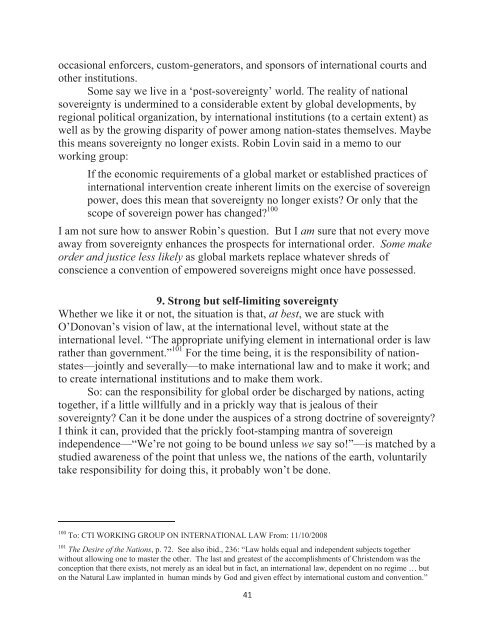International Legal Evangelism: Intelligence, Reconnaissance & Missions
International Legal Evangelism: Intelligence, Reconnaissance & Missions
International Legal Evangelism: Intelligence, Reconnaissance & Missions
Create successful ePaper yourself
Turn your PDF publications into a flip-book with our unique Google optimized e-Paper software.
occasional enforcers, custom-generators, and sponsors of international courts and<br />
other institutions.<br />
Some say we live in a ‘post-sovereignty’ world. The reality of national<br />
sovereignty is undermined to a considerable extent by global developments, by<br />
regional political organization, by international institutions (to a certain extent) as<br />
well as by the growing disparity of power among nation-states themselves. Maybe<br />
this means sovereignty no longer exists. Robin Lovin said in a memo to our<br />
working group:<br />
If the economic requirements of a global market or established practices of<br />
international intervention create inherent limits on the exercise of sovereign<br />
power, does this mean that sovereignty no longer exists? Or only that the<br />
scope of sovereign power has changed? 100<br />
I am not sure how to answer Robin’s question. But I am sure that not every move<br />
away from sovereignty enhances the prospects for international order. Some make<br />
order and justice less likely as global markets replace whatever shreds of<br />
conscience a convention of empowered sovereigns might once have possessed.<br />
9. Strong but self-limiting sovereignty<br />
Whether we like it or not, the situation is that, at best, we are stuck with<br />
O’Donovan’s vision of law, at the international level, without state at the<br />
international level. “The appropriate unifying element in international order is law<br />
rather than government.” 101 For the time being, it is the responsibility of nationstates—jointly<br />
and severally—to make international law and to make it work; and<br />
to create international institutions and to make them work.<br />
So: can the responsibility for global order be discharged by nations, acting<br />
together, if a little willfully and in a prickly way that is jealous of their<br />
sovereignty? Can it be done under the auspices of a strong doctrine of sovereignty?<br />
I think it can, provided that the prickly foot-stamping mantra of sovereign<br />
independence—“We’re not going to be bound unless we say so!”—is matched by a<br />
studied awareness of the point that unless we, the nations of the earth, voluntarily<br />
take responsibility for doing this, it probably won’t be done.<br />
<br />
100 To: CTI WORKING GROUP ON INTERNATIONAL LAW From: 11/10/2008<br />
101 The Desire of the Nations, p. 72. See also ibid., 236: “Law holds equal and independent subjects together<br />
without allowing one to master the other. The last and greatest of the accomplishments of Christendom was the<br />
conception that there exists, not merely as an ideal but in fact, an international law, dependent on no regime … but<br />
on the Natural Law implanted in human minds by God and given effect by international custom and convention.”<br />
<br />
41

















